Young Europeans in Africa: Work, Personal Experience and Impressions
How is it to get a job and go to work not just abroad but on another continent?
It seems that first you should inform your nearest and dearest. It’s highly likely that your parents and other older relatives will start sighing and groaning, asking you where and why you’re going because it’s dangerous.
Other people will probably start sharing creepy stories about expats who left their country for work reasons and then prayed to get home safe and sound.
But your friends may try to help you find necessary and useful information about where to go, what employers can be trusted and what life in a foreign country is like.
All those people around you will be right because when you’re young and adventurous enough, it’s quite easy to get into trouble. There are really a lot of scary stories about expats, so any useful information is badly needed. This is what we’re going to focus on and welcome you to read three interviews with those who have dared to go abroad for work and… Let them tell us about their experience by themselves.
Meet Martin, Sofia and Ekaterina, Carthage Group employees and the members of our international team. They are young Europeans who have come to work in the travel & hospitality industry in a Muslim country in Africa, so their integration into a new environment has been complicated by the necessity of getting used to living in a completely different social and cultural environment.
Expectations vs Reality: let’s find out how the guys have managed to settle down in North Africa, in Tunisia and if they consider such experience valuable for becoming real professionals on a chosen career path.
MARTIN
What country were you born in, what kind of education did you receive? What foreign languages do you speak? What are you interested in, what pleases you the most?
I was born in Bulgaria, almost right after that we moved to Italy and lived there for eight years. This year I’ve graduated from a gymnasium of foreign languages, my specialty is geography and economy, geopolitics and natural history. Partly thanks to this knowledge I have extra information that helps me in my work in Tunisia. In addition to Bulgarian, I speak English and Spanish very well.
Most of all I like studying history but I also follow the latest world news. I like meeting new people and learning about the cultures of different countries. One more of my hobbies is hiking and trekking.

How did you come up with an idea to work abroad? How did your family and friends react to it?
My colleague Sofia helped me make this choice (actually, I didn’t have any because it was an offer I couldn’t refuse).
In general my family reacted positively. We’ve visited many European countries, so my parents were pleasantly surprised at my decision to go to Africa for work, since such experience would be invaluable for my future career.
However, to be honest, they supported me not right away. At first my family was skeptical about it but after I talked to them and convinced them my parents agreed that it’s safe in that part of Africa, in Tunisia. Unlike my family, my friends liked the idea and supported me from the very beginning, so I’m truly grateful to them.
Now you’re living in a Muslim country. What about your integration into local culture with its customs and traditions? What do you like and what causes confusion?
The fact that I’m in a Muslim country now doesn’t make my life worse in any way. Although sometimes early in the morning I’m awaked by the sound of muezzins’ calls for prayer that can be heard from mosques.
However, of course, there are some difficulties. I’m still not fully used to local cuisine and miss Bulgarian foods and dishes.
I’m also confused by local traffic because sometimes it’s just impossible to guess where a car is turning. I won’t wish anyone to drive a car in Tunisia! That’s why I have great respect for the skills of bus drivers who work in Carthage Group. They do their job perfectly well.
Do you feel safe when living in this country?
I have no doubt about my safety here. For example, I can easily go for a walk around the city at any time of the day, even late at night and I do it without fear or feeling uncomfortable.
How did Tunisians welcome you? Did you make new friends here?
Locals are so friendly that I was surprised by it.
Not many people in Tunisia speak English very well but those who do it turned out to be very nice and interesting people. I exchanged contact information with some people and we keep in touch on the Internet.
I made friends among hotel staff, and communicating with them lifts my mood and boosts my energy. It’s especially helpful after long and intense excursions.
What is your job now, what responsibilities do you carry out? Do you get any useful experience? Do your more experienced colleagues support you?
I’m an interpreter, I meet and greet tourists and partly help them at hotels. This job helps me gain self-confidence and overcome the fear of public speaking.
Moreover, I live completely independently here, so I’m learning to be independent in everything. I’ve become more responsible not just for myself but other people as well, for example, for a group of travelers in a tourist bus.
Colleagues, who have been working in the industry for a long time, give me pieces of advice which help solve tourists’ problems on the spot very quickly. They explain to me the subtleties of working in tourism, teach me to speak to people in the right way, to structure my speech and so on.
How long is your working day?
The duration of my working day depends on the duration of guided tours. It can last three hours or almost two full days if we consider a trip to the Sahara desert.
What personal qualities, in your opinion, helped you to become a member of the Carthage Group team?
I’m good at lightening people’s mood and getting along with them. Thanks to these qualities, the excursions which I attend have a really friendly and pleasant atmosphere and both guests and I like it very much.
What prevails in your work: discipline or creativity? Are you easy-going or methodical?
Creativity prevails. I think such an approach allows me to be more flexible while fulfilling tasks.
Your colleagues came to Tunisia from all over the world. Is it interesting to be a member of an international team?
Since we all arrived from different countries we have different cultural backgrounds and expectations of Tunisia. It’s interesting, I meet people with various aims and desires, different mentalities.
Carthage Group is a company that has been working in the tourism industry for a long time. It has an excellent and well-earned reputation. Which guarantees given by such an employer did you pay attention to when making a decision on a job offer?
Irina Boukadida, a representative of Carthage Group, sent me an agreement, so before going to Tunisia for work I read it carefully. For me personally it was enough.
Expectations vs Reality: is it going the way you wanted?
My expectations weren’t too high from the very beginning. And after almost three months of working I can say that reality turned out to be great. So from now on I will have wonderful memories of Tunisia forever.

SOFIA
What country were you born in, what kind of education did you receive?
I was born in Ukraine, moved to Bulgaria four and a half years ago. I’ve graduated from school this year, now I’m 18 years old.
While going to school in Bulgaria, I learnt Bulgarian, I speak it fluently. I also speak Ukrainian and, of course, English – it seems to me that English is basic, everyone speaks English.
Are you going to continue your education? How did it happen that you ended up working in Tunisia?
As for further education, yes, I’m definitely going to continue it. I passed a written state exam, entered a university, so I will have lectures very soon. My future specialty is related to the study of the impact of climate change on different aspects of our lives.
Speaking about working in Tunisia, it started with my desire to try working in the travel industry, so I was looking for a job in Bulgaria and accidentally saw a job offer from Carthage Group. And I thought why not?
I contacted the company’s representative, Irina Boukadida. She asked me to write a CV, an applicant’s résumé. It was quite a challenging task for me because I had never written such papers before. After that I had a video interview and after two or three months we talked again. All that time I wasn’t sure that I would be hired. I thought that there were more suitable applicants with completed university education related to tourism, so they would be potentially more prospective than me. But it worked out well.
How did your parents react to your desire to go abroad for work?
At first they were really worried and didn’t want to let me go.
But my mom likes traveling, visiting different places and meeting new people. She also has friends who are tour guides, so she asked them about working in tourism in various countries. Finally, she approved my choice, she agreed that it’s cool.
Were there any problems with the fact that the departure was planned for North Africa?
It’s quite a funny story. My mom knew that it’s safe in Tunisia. We read a lot about the country together, watched videos from travel bloggers on the Internet. We have friends who went to Tunisia as tourists, and they told us how they had gone for walks here and talked to people. In short, we made inquiries and knew how things were going.
But when my grandma learnt where I was going, she got scared and asked if I knew that there are tribes in Africa who eat people. I told her that Africa is big and such tribes really exist but not in Tunisia.
I’m glad that I managed to convince my grandma that everything would be fine.
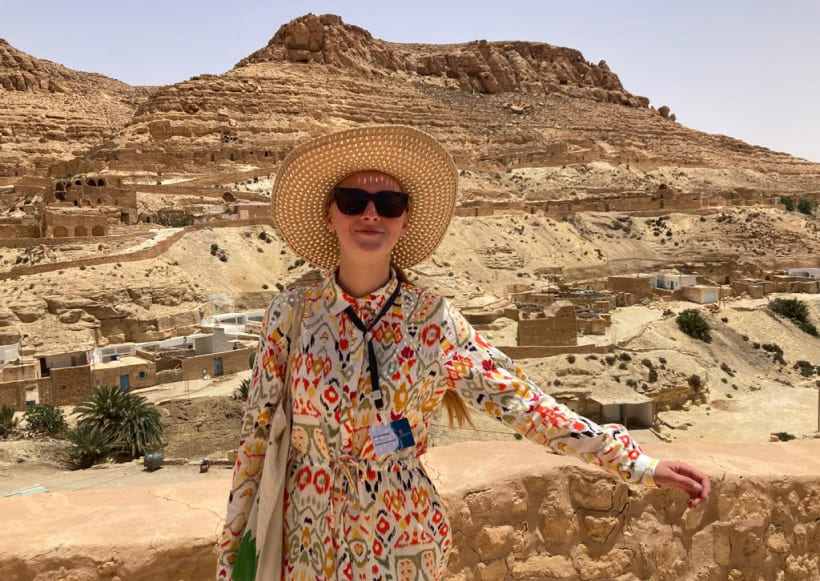
How was it in fact? Did expectations meet reality?
My motto is “Don’t start anything having high expectations and you won’t be disappointed”. Therefore I didn’t expect anything special, only that it would be comfortable and safe, it would be interesting to work with new people and I would have to communicate a lot.
So I have everything that I expected.
Carthage Group has been working in the tourism industry for many years, the company’s reputation is actually a guarantee of legal and safe employment. What are the relations with such an employer like? Do you have a contract?
Sure, we have an official agreement. In terms of organization, everything related to contracts, safety and payment is clear.
I established a very good relationship with a person who hired me, the representative of Carthage Group, Irina Boukadida. She is interested in how we spend time in Tunisia and always stays in touch. It makes me feel much safer and calmer.
Did Tunisians seem to you open and friendly? Or their culture is absolutely different?
To be honest, at first I thought that it would be rather difficult to develop mutual understanding. However, it turned out that Tunisians are very friendly and welcoming. I have something in common with everyone who I communicate with, especially with young people. We make similar jokes, our life goals are mostly the same.
I don’t feel that they are very different from me. In fact, I can say that Tunisians are European Africans.
Speaking about your work in particular, what are you doing?
Our work is divided in three parts: work at the airport, at hotels and attendance of tourist groups as a guide.
I live at the hotel Club Novostar Omar Khayam Resort & Aqua Park 3*, attend information meetings with travelers and help tourists from Bulgaria in the airport.
Of course, I also work as an interpreter and a tour guide assistant on excursions, for example, with Alex Peremot, the head of the Excursion Service Department in Carthage Group. Tours with Alex are top ones, Alex has learnt a lot of Bulgarian words, so it’s almost unnecessary to translate his speech because tourists understand him well. At the end of tours travelers come up to thank him and express their admiration, it always happens, for instance, after trips to the Sahara. When I work with Alex I feel like a real pro.
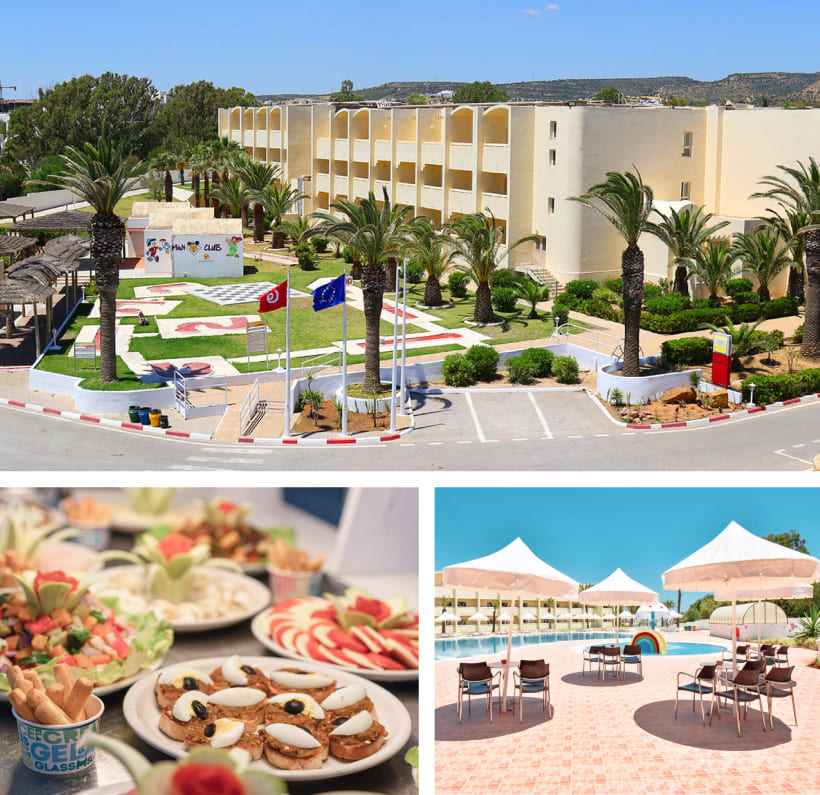
What prevails in your work: discipline or creativity?
It depends on the kind of work. Thus, in the airport or at info meetings it’s always discipline. As for excursions, there’s always some space for creativity. You can always add something, for example, give some relevant information about cactuses growing by the roadside.
Working with tourists in general can’t help but be creative. You should know how to get along with different people and I’m learning to do it from my other colleague, a tour guide Mohamed Bouzaien. He’s very attentive to guests, he notices how they react to his stories and adapt the program for a situation.
You probably have a very busy work schedule?
We’re given tasks in the evenings, so I never know in advance where I will be tomorrow: in Friguia Park, the Sahara or on any other excursion. I understand it because I know that first it’s necessary to gather people, organize everything and an interpreter is not assigned in the first place.
I can’t say the schedule is too busy. There are some difficulties anyway. For instance, when we have long tours where a lot of information is provided or when we accompany large groups of tourists. Then I can feel that I’m tired.
And you want to stay in bed and keep silent… Is it physically more difficult for you in Tunisia than in Bulgaria?
Yes, after long excursions I want to detach myself from work for a while. But still such trips are an unforgettable experience.
Tiredness is more mental rather than physical. It’s physically tiring, maybe just to travel from the island of Djerba to the Sahara, it’s a two-day trip. But after that we have a day off.
Hot weather in Tunisia doesn’t bother me, I didn’t even have to get used to it. Bulgaria, where I came from, is also not a northern country, so high temperatures are typical of the country as well. By the way, from my perspective, it’s easier to tolerate summer heat in Tunisia. Sometimes it’s so hot in Bulgaria that you try not to go outside during the day, you put off everything till the evening. Here it never happened to me, though we’re in Africa.
If you don’t mind me asking, how much do you earn per month?
Everything depends on the tourist season, the number of travelers, working days and so on. Now my average monthly income is about 800-1000 euros.
A permanent, basic part of my salary is 400 euros, commission can be higher. In Carthage Group the final amount totally depends on your ability to learn something new and rethink your personal experience, on your desire to work, diligence and professionalism.
So your income consists of a fixed pay plus commission? What do you have to spend money on in Tunisia?
Yes, our income is a fixed salary plus commission. We don’t spend money on accommodation, All Inclusive meals are served at hotels where we live. A flight to Tunisia and a visa were also paid by the company. All necessary things to live in comfort are provided by Carthage Group.
So the only matter of expense is entertaining, for example, when we go out to the city. But prices for taxis and in establishments in Tunisia are quite low by European standards, so we don’t spend a lot.
How do you spend your free time most often?
I like going for a walk. I walk along the streets and learn local customs. For instance, I look at Tunisian men sitting in street cafes and emotionally discussing something – there’s a tradition of such evening gatherings. I like meeting people in general, learn about their customs and culture.
If I stay in the hotel, I read books. There’s a little library at Club Novostar Omar Khayam Resort & Aqua Park 3* and I’m reading the fourth book while working in Tunisia.
The hotel where you’re living now is located in a popular tourist area in the town of Hammamet. Did you travel to other Tunisian cities by yourself?
Actually, my colleague Martin and I are thinking about traveling somewhere. We have an opportunity to do it because we have one or two days off a week.
But for now we are completely immersed in our work, which we don’t want to be distracted from. We also haven’t managed to get around all the interesting places nearby yet, so we have something to do when we have free time. I think we will definitely go on our own trip around Tunisia but a bit later.
Moreover, you visit so many places for work. Which excursions do you find the most fascinating?
Of course, it’s a trip to the Sahara with a stop in El Jem which we make on our way from Hammamet. ‘Three Capitals’ is a tour that always delights shopaholics because they can buy lots of souvenirs. Personally, I’m waiting for the reopening of the Bardo National Museum which is currently closed for renovation. A visit to the museum will make the tour ‘Three Capitals’ even more memorable.
I haven’t been to Zaghouan but I’d like to go there, my colleague Martin has told me a lot about this place. I also know that Dougga is very interesting as well.
Furthermore, I really like a tour to Sousse and Monastir when we visit two museums and two Arab medinas. I haven’t seen a tourist who wasn’t impressed with this excursion.
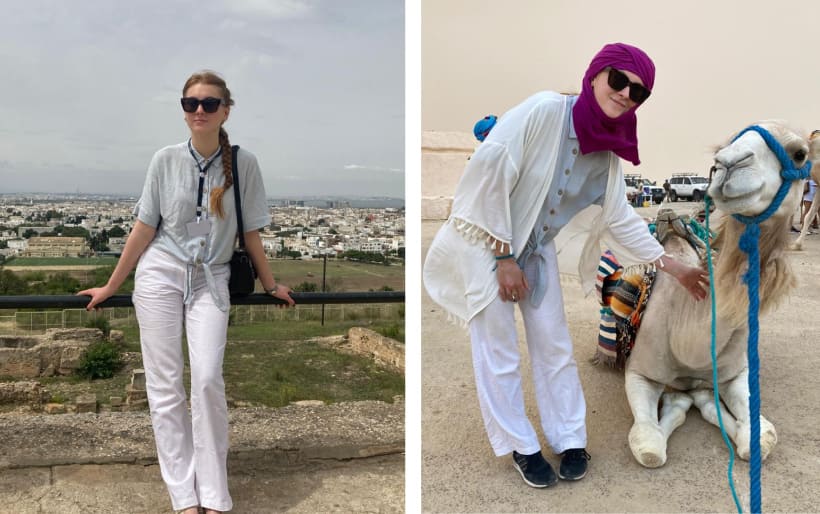
In Tunisia they speak a local dialect of the Arabic language. Have you learnt any words in this language?
Yes, I communicate not only with tourists. We’ve been to a little town of Chenini in the Sahara, almost all its residents have left. During the tour we visited a small restaurant and while tourists were having lunch, I started talking to the manager of the restaurant. We talked about the town and life there. He liked that I already knew a lot and he taught me a few new words. I also learn new words at the hotel from animators and other staff members.
In Carthage Group you probably have to contact a lot of people from different countries. Is internationalism noticeable?
Yes, my colleagues came from different countries. There are some people who have been living in Tunisia for a long time and like telling you about the country, you can discuss many things with them.
It really means a lot to me – to meet new interesting people and discover something new.
If after the end of the season, next year, they offer you to work here again, will you agree?
I like Tunisia and in general I’d like to come back here if it doesn’t interfere with my study schedule. The reason is that it’s a place where you can see the history with your own eyes, there are numerous attractions related to the history of mankind.
Moreover, I’ve realized that I’d like to work in the tourism industry. It’s not necessarily in Tunisia but I’d be happy to continue working in Carthage Group. By the way, I’ve already discussed it with my colleagues who worked in our team in other countries. I hope I’ll work it out.
EKATERINA
What is your education? Do you have experience of living in different countries?
I have a diploma in diplomacy and economics, and since graduating from high school, I’ve been living and working a lot in different countries. Actually, a significant part of my post-school education was distance learning, because I almost always lived and worked not in the same country where I studied.
Recently, I’ve been living in Romania, where I learned Romanian, that’s why I work in Carthage Group with tourists from this country. Before that, I lived in Jordan and many other places.
How did it happen that you ended up in Tunisia?
I arrived here for the first time when I was 19 years old. I lived here for over 5 years, so when I started working here, the country didn’t surprise me at all. I know both popular resorts where I work and the North of the country very well. I’ve been to many places where organized groups of tourists have never been to, I also know medinas of several cities.
What is special about Tunisia? What makes you happy here and what doesn’t? Are there such things?
I like Tunisia, I’ve fallen in love with this country. Of course, Tunisia has local peculiarities. Tunisians are exceptionally friendly, at least those who are around me. It’s been several times that people who didn’t know me at all and had never seen me before helped me. People smile a lot here.
Nobody in Tunisia is even in a hurry. Almost everything is almost always delayed and starts behind the stated schedule. Even if you go to the cinema, it’s highly likely that a film will start about 30 minutes late. Fortunately, it has nothing to do with my current work, everything is always done in a timely manner in Carthage Group. I can’t remember a day when a bus or an employee was late. However, it’s related to professionalism.
As for everyday life in Tunisia, its pace is very slow, so it irritates you and makes you happy at the same time. On the one hand, it makes you nervous when you’re in a hurry. On the other hand… In Tunisia you can slow down. You’re surrounded by the sea, the sun and mountains. You can live the moment and enjoy it. If you get this laid-back vibe, you can relax completely.
Tunisia is a Muslim country. Are there any restraints directly related to it, which weigh on you?
As for Islam, I can say that Tunisia is probably the most secular state out of the Muslim countries. People here keep a wider perspective on clothes, in contrast with some other countries of Arab culture. In short, some restraints don’t weigh on me.
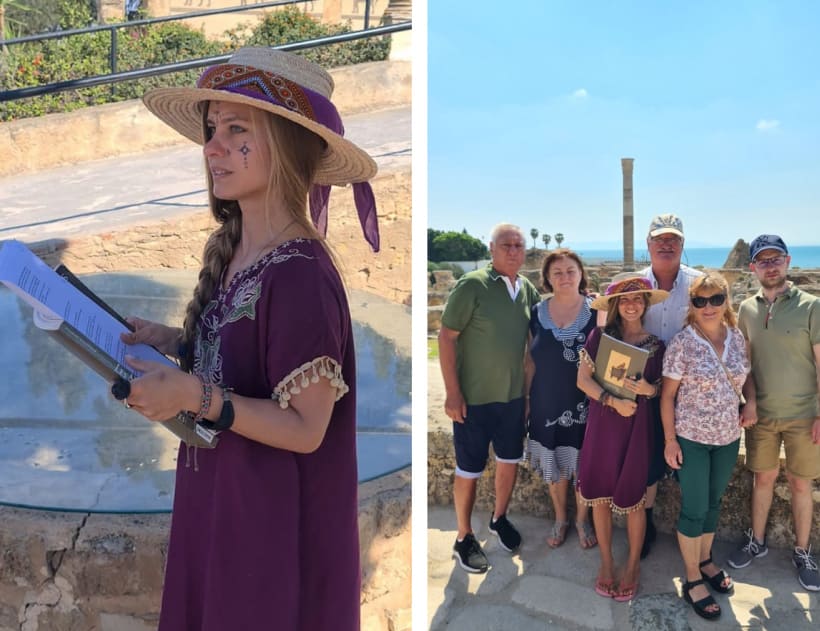
What foreign languages do you speak?
It helps me a lot that I speak French well, and also I speak a local Tunisian dialect of the Arabic language a bit. These two languages allow me to communicate with Tunisians in any part of the country and discuss any topics. However, I know that some guys in our team speak only English and it’s OK, everybody understands them and they understand everybody too. Of course, I speak Romanian as well.
You’re currently a member of the international team of Carthage Group. Is it interesting to work with such colleagues?
The multinational team motivates me a lot. “Diversity is power”. It’s one of the main reasons why I work abroad. I’m interested in it and I always try to do what’s interesting to me.
What are your job responsibilities? What does this work teach you? Which new and valuable experience do you gain?
I mostly work on excursions, most often they are trips to the Sahara and the tour ‘Three Capitals’. The main goal of a guide and me is to make these tours delight tourists. I interpret the guide’s speech, help to have good communication and always try to do more.
For example, once we visited a Berber village and I did temporary Berber tattoos to all travelers. Their emotions were super positive. I also often dress in national costumes, sometimes I change clothes several times during a trip.
In general, I want every guided tour to be a real adventure but not just a bus ride with a sound accompaniment.
And what do you like most about your work, what is the most important thing in it?
It’s fascinating to watch how people change when they go on a journey.
I communicated with Romanians in their home country a lot, and I can say that they are people of one kind there, they have certain limits, boundaries, assumptions, etc. Here they are people of a totally different kind, they are open to new experiences, sociable, like listening to new information, express sincere emotions.
It’s really cool, maybe it’s what I like most about my work in the travel industry.
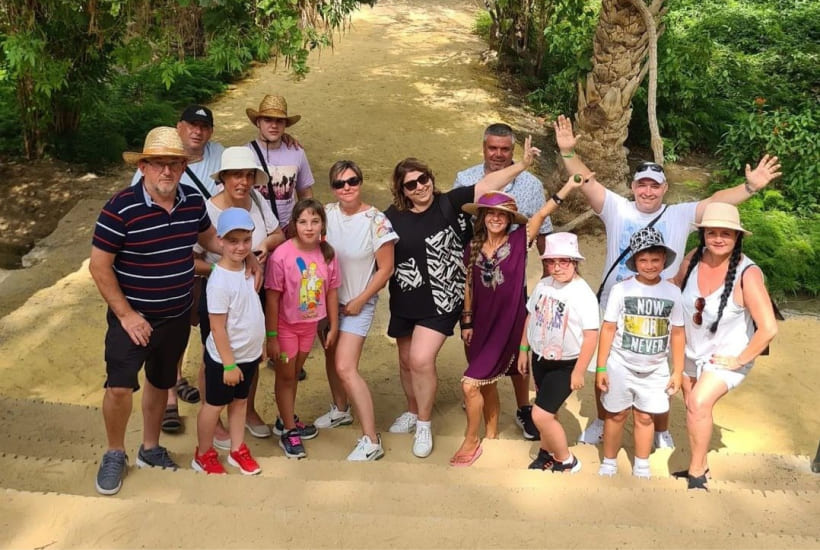
This is the conversation we had with young Europeans who work in Tunisia in the international team of Carthage Group.
We can only add that we’re happy to watch the development of new professionals who are able to bring people joy and open incredible and unique Africa to travelers. We’re sure that working with senior colleagues will be a really invaluable experience for the guys.
The connection between generations, mentorship – these aren’t just words for the members of the Carthage Group team. We’re proud to say that since 2003 we’ve helped several generations of specialists to make a career and become real professionals, thanks to whom our guests enjoy learning something new and interesting about the history, culture and nature of countries which they want to explore.

